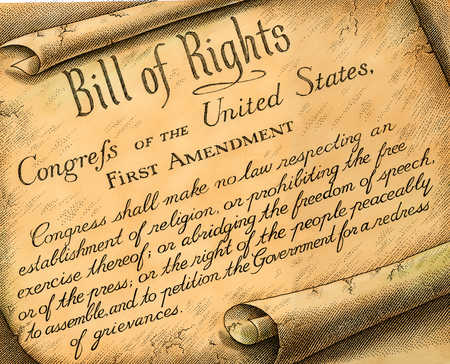© Josh Sager – May 2014
On May 5th, 2014, the Supreme Court’s conservative majority struck yet another blow against the 1st Amendment with their decision in Town of Greece v. Galloway. This case represents a fairly large step down a very slippery slope towards legitimizing government-sponsored religion in our public forums.
The Greece v. Galloway case centered around the constitutionality of performing an official prayer before Town Board meetings in Greece, NY. For the past fifteen years, the town of Greece has opened town board meetings with a prayer by a pastor selected from a list of local religious institutions—while several of these religious leaders in recent years have been non-Christian, the VAST majority of these speakers over the years have belonged to a denomination of Christianity.
While the town claimed that the prayers offered before meetings were non-sectarian (mentioning god, but not specifying which god) in order to conform to the 1983 Marsh v. Chambers decision, this is simply not true. Many such prayers invoked Jesus, and his supposed sacrifice for humanity’s sins.
To be fair to the town board of Greece, they did make at least a token effort at giving other faiths their time to run prayers, and it is certainly true that the majority of the Greece population is Christian. That said, this does nothing to mitigate the fact that mandating an official prayer time represent putting religion ahead on non-religion; additionally, the fact that Christian chaplains were afforded almost every prayer opportunity puts Christianity above all other religions in regard to being sponsored by this town.
The Supreme Court
The true fallacy of the Supreme Court’s decision is illustrated in the following quote from Kennedy’s majority decision:
“To hold that invocations must be nonsectarian would force the legislatures sponsoring prayers and the courts deciding these cases to act as supervisors and censors of religious speech, thus involving government in religious matters to a far greater degree than is the case under the town’s current practice of neither editing nor approving prayers in advance nor criticizing their content after the fact.”
In short, Kennedy is arguing (for the conservative majority) that it is okay for religious authorities to be asked to lead prayers before a public forum in an official capacity, while also arguing that it would violate the constitutional right to free speech to prevent them from giving sectarian speeches that endorse a particular religion over others.
Obviously, this is ridiculous and would lead to the state giving de-facto sponsorship for one religion over others. By simply scheduling religious people who will give sectarian talks before the meetings, the city could give one religion an unfair and unconstitutional advantage over every other religions as well as non-religion. Given the demographics of our country, the most likely beneficiary of this advantage is Christianity.
Taken to its logical conclusion, this decision gives cities and states a giant loophole in the establishment clause of the 1st Amendment that will allow them to sneak religion in through the back door. If you can’t edit or approve prayers in advance, nor can you criticize them after the fact, it creates a situation where there is simply no accountability—any town, city, or state official who has the power to schedule an official prayer can insert their zealot of choice into the public sphere and never be held to account or prevented from doing to again.
Beyond the matter of sectarianism, this decision also brings up the vital problem of assuming a god’s existence in the first place. Even if prayer is “limited” to generic appeals to god, this still discriminates against any religion which doesn’t have a god (ex. pantheism or animism) as well as atheism.
Conclusion
A perfectly valid solution to this case would have been to strike the prayer from the public meetings and to substitute a short time for silent and personal prayer, meditation, contemplation, or even Angry Birds iPhone game time. By doing this, everybody can have their prayer or non-prayer of choice, while the state can preserve its neutrality and guarantee religious freedom to all.
Unfortunately, this Supreme Court appears to be pursuing a radical interpretation of the 1st Amendment that completely distorts its meaning. According to this Supreme Court, corporations are people with speech rights (which also might have religious rights, depending upon how they decide in the Hobby Lobby case), wealthy people have a constitutionally protected right to more speech than poor people, and the establishment clause doesn’t bar the local or state governments from de-facto establishing a religion.

In short, the Roberts Court majority is either wholly ignorant of the law and our country’s history, or they are trying to rewrite both in service to their own narrative—either way, they should step down or face impeachment for rank incompetence and corruption.



We will soon be lost.
LikeLike
RIGHT ON!!!
LikeLike
Pingback: The Supreme Court Rules on Union Dues and Contraception, Strikes Blows Against Workers and Women | The Progressive Cynic